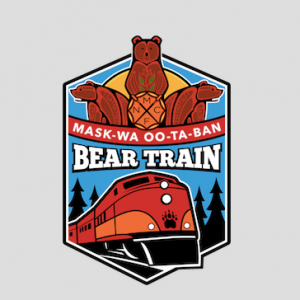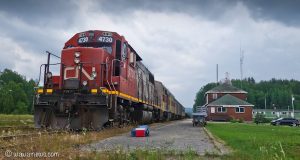 On June 4, approximately 25 representatives from stakeholder and potential funding organizations met to discuss funding options to re-instate the Sault Ste. Marie to Hearst passenger train as the Mask-wa Oo-ta-ban (Bear Train). Participants from Sault Ste. Marie, Wawa, Dubreuilville and Hearst agreed that the passenger train is important to the economic, employment, social and remote access needs of First Nations, communities, businesses, property owners and visitors of the Algoma region. They are developing plans for it to eventually be self-sustaining. The train will Provide Four Season Carbon Friendly Transportation and Benefit the Algoma Regional Economy by $40 to $50 Million Annually
On June 4, approximately 25 representatives from stakeholder and potential funding organizations met to discuss funding options to re-instate the Sault Ste. Marie to Hearst passenger train as the Mask-wa Oo-ta-ban (Bear Train). Participants from Sault Ste. Marie, Wawa, Dubreuilville and Hearst agreed that the passenger train is important to the economic, employment, social and remote access needs of First Nations, communities, businesses, property owners and visitors of the Algoma region. They are developing plans for it to eventually be self-sustaining. The train will Provide Four Season Carbon Friendly Transportation and Benefit the Algoma Regional Economy by $40 to $50 Million Annually
“Currently, the Algoma region is a distressed area for employment and economic opportunity,” “The Algoma region has lost hundreds of thousands of dollars since the train stopped running.’” Or ‘The Algoma economy has lost hundreds of thousands of dollars since the train stopped running.’ said Chief Jason Gauthier of the Missanabie Cree. “For the past four years, making the Bear Train a reality has been an initiative of First Nations, communities, and socio-economic stakeholders to resume the Algoma passenger train service.”
“We are still hopeful that the federal government will reinstate the funding that was cut in 2014 by the previous Conservative government,” said Chief Gauthier. “Time is running out to make a commitment before this fall’s federal election. The infrastructure is already in place. The Bear Train would seem to be a perfect example of economic reconciliation.”
Councillor Sandra Hollingsworth stated that “the Sault Ste. Marie City Council understands that restoring the passenger train is extremely important for the local economy and will help to make it happen.”
Carol Hughes, Member of Parliament for Algoma-Manitoulin-Kapuskasing travelled from Ottawa to attend the forum. She stated “I have tabled hundreds of petitions in the House of Commons signed by thousands of people and have been pushing for the reinstatement of the subsidy since it was cut”. She added, ” There is much support to put the train back on the rails.”
Approximately 400 kilometres of the 470-kilometre route is not accessible by road, which should qualify the Bear Train for remote funding from the federal government, similar to First Nation owned railways in Manitoba and Quebec/Labrador. Safe, reliable transportation for residents of First Nations and other communities and businesses is critical not only for economic development but for the safety of women and children and others who travel for school, employment and medical services.
- Men’s Curling Standings as of March 2nd - March 4, 2026
- Split the Pot Lottery “Marches Into Gold” - March 2, 2026
- New leaders take helm of United Steelworkers union - March 2, 2026
 Wawa-news.com Local and Regional News
Wawa-news.com Local and Regional News

